Grilling is one of the joys of outdoor cooking, but it can quickly turn dangerous if a grease fire erupts. Knowing how to stop a grease fire on a grill is essential for both seasoned grill enthusiasts and beginners alike. Grease fires occur when fat or oil drips onto hot surfaces or flames, igniting a blaze that can spiral out of control in seconds.
The first and most important step when dealing with a grease fire is to stay calm. Never use water to extinguish the flames, as this can cause the fire to spread rapidly. Instead, if it is safe to do so, turn off the grill burners to stop adding fuel to the fire. Next, cover the flames with a metal lid or a baking sheet to cut off the oxygen supply, which will help smother the fire. If the fire persists, use a fire extinguisher rated for grease or kitchen fires, ensuring that you aim at the base of the flames. Always keep a safe distance to protect yourself from burns or injury.
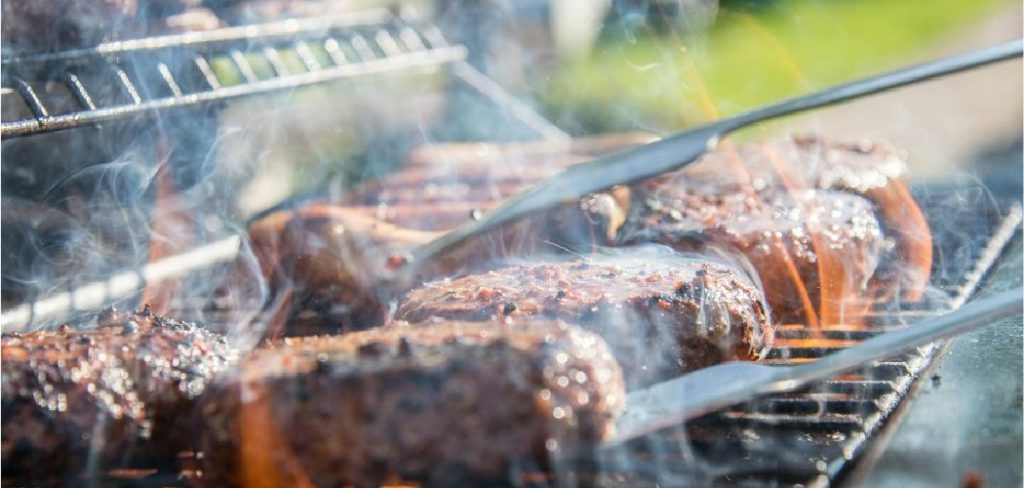
If you’ve found yourself staring at a fire on your grill and panicking, you’re not alone. The good news is that grease fires are manageable if you act quickly and correctly. Throughout this guide, you’ll learn how to identify, handle, and prevent grease fires with ease. By the end of this article, you’ll feel confident enough to enjoy your grill safely—no matter what’s on the menu!
Why Stopping a Grease Fire Matters
Grilling is not just a cooking technique; for many, it’s a way of life. From weekend barbecues to celebratory cookouts, the grill is the centerpiece of many gatherings. While the sizzling sound of a perfect steak is music to the ears, overlooking safety can lead to potentially hazardous situations.
Grease fires are dangerous because they can intensify rapidly, fueled by fats and oils. Without proper intervention, they can damage your grill, injure those nearby, and even spark larger fires. Worse, many people wrongly assume that using water will extinguish a grease fire—this mistake can actually cause the fire to spread.
Understanding how to handle such situations isn’t just for safety; it ensures you can grill with peace of mind. Whether you’re a beginner or a seasoned griller, knowing how to prevent and stop a grease fire empowers you to enjoy cooking outdoors without unnecessary fear.
Step-By-Step Guide on How to Stop Grease Fire on a Grill
When a grease fire breaks out, every second counts. Follow these steps to effectively stop a grease fire on a grill and prevent it from escalating. Remember, the key is to stay calm and act deliberately.
Step 1: Stay Calm and Assess the Situation
The first thing to do when you see flames is to remain calm. While it’s natural to feel a rush of panic, keeping a level head allows you to react more effectively. Take a deep breath and evaluate the situation. Is the fire small and contained within the grill, or is it beginning to spread? This assessment will dictate your next steps.
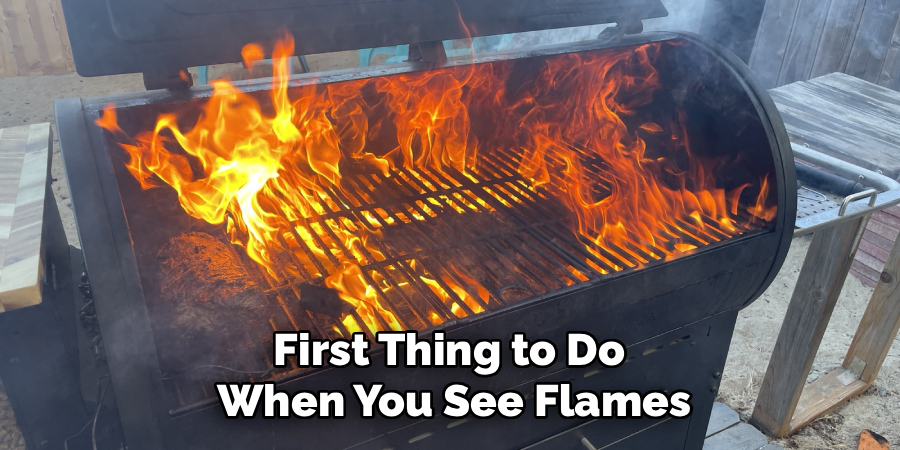
If the fire remains inside the grill, you have several safe solutions. However, if it spreads beyond the grill’s boundaries or becomes out of control, prioritize your safety and call emergency services immediately.
Step 2: Shut Off the Grill’s Fuel Source
If you’re using a gas grill, immediately turn off the knobs controlling the gas supply. This crucial step cuts off the fire’s fuel source, preventing it from growing larger. Locate your propane tank or natural gas line and shut it off completely. Ensure all burners are off—you don’t want any lingering sparks to reignite the blaze once the fire diminishes. For charcoal grills, close the vents to limit airflow to the flames.
Step 3: Close the Grill Lid
The next step is to smother the fire. Close the grill lid to trap the flames and starve them of oxygen. Without a steady oxygen supply, the fire will begin to extinguish itself. Keep the lid closed and avoid peeking inside prematurely—this only introduces fresh oxygen. Leaving the lid closed for several minutes is usually enough to eliminate most grease fires.
Step 4: Use Baking Soda or a Fire Extinguisher
If the fire persists after closing the lid, it’s time for reinforcements. Baking soda is a natural fire suppressant and works remarkably well on grease fires. Open the lid carefully, ensuring not to fan the flames, and sprinkle generous amounts of baking soda directly onto the fire. The sodium bicarbonate will react with the grease and douse the fire quickly.
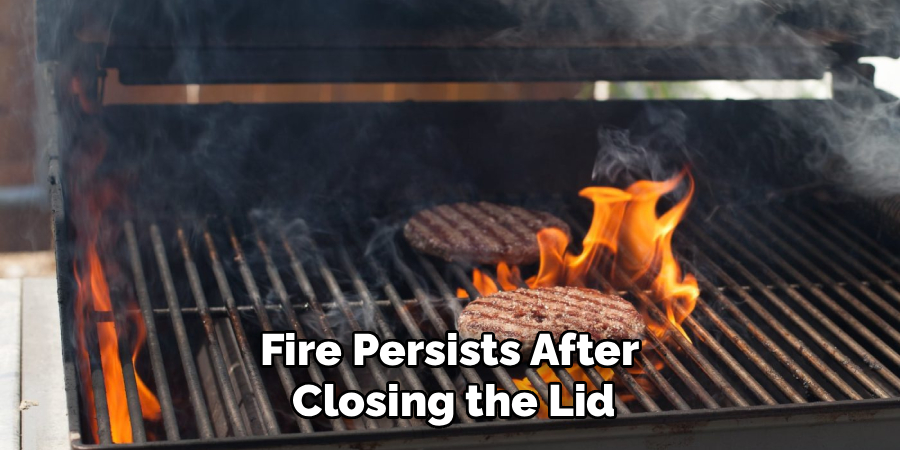
Alternatively, a fire extinguisher rated for grease and kitchen fires (Class B or ABC) is another effective solution. Aim at the base of the flames and spray in a sweeping motion until the fire is completely out.
Step 5: Never Use Water on a Grease Fire
It’s critical to remember that you should never use water to extinguish a grease fire. Water reacts violently with hot oil, causing the fire to spread and possibly creating dangerous splatters of burning grease. Even in moments of panic, resist the urge to grab a hose or water bucket, as this can worsen the situation dramatically.
Step 6: Remove the Food and Grease Build-Up
Once the fire is extinguished, you’ll need to inspect your grill. Remove any charred food or grease build-up that may be lingering. Built-up grease is a common culprit of recurring grill fires, so addressing this residue immediately minimizes future risks. Allow your grill to cool completely before cleaning to prevent burns or further incidents.
Step 7: Inspect Your Grill for Damage
After cleaning, inspect your grill for any visible damage. Look for warping, melted components, or cracked grates. Ignoring damaged areas could lead to unsafe grilling conditions later. If any parts appear compromised, consult your grill’s manual for repair or replacement instructions. A thorough inspection ensures your equipment stays in peak condition for future use.
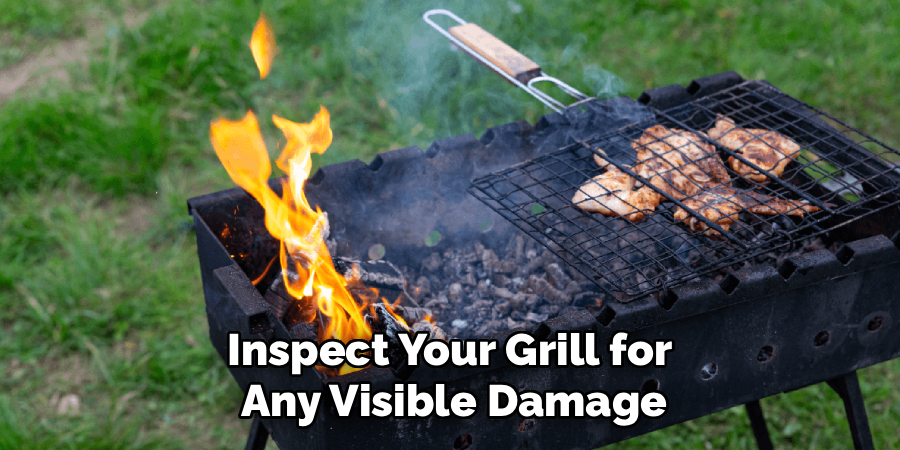
Step 8: Prevent Future Grease Fires
Prevention is the best policy when it comes to grease fires. Clean your grill grates and grease trays after every use to keep fat build-up to a minimum. Trim excess fat from meats before grilling, and monitor fatty cuts of meat closely while cooking. Always keep a box of baking soda or a fire extinguisher nearby as an additional layer of safety. With these measures in place, you can reduce the likelihood of encountering a grease fire.
Grill Maintenance Tips
Proper grill maintenance is crucial for ensuring safety, extending the lifespan of your grill, and enhancing the flavor of your food. Start by cleaning the grill grates after each use to remove residue and prevent buildup. Use a grill brush or a ball of aluminum foil to scrub the grates thoroughly while they are still warm.
Routinely check and empty the grease tray to avoid overflow or fire hazards. Inspect burners and gas lines for obstructions or leaks, as these can affect performance and safety. If you use a charcoal grill, make sure to remove ashes regularly to maintain proper airflow. Always cover your grill when not in use to protect it from the elements, and consider deep cleaning once or twice a year to keep it functioning at its best. With consistent care, your grill will remain a reliable tool for countless delicious meals.
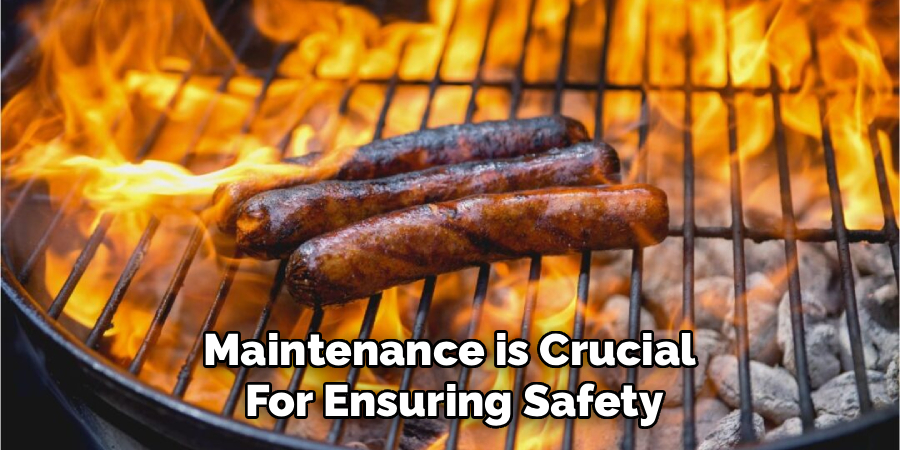
Additional Content
Grilling is not just a cooking method, but also an art form. With the right techniques and tools, you can elevate your grilling game and impress your friends and family with mouth-watering dishes.
One way to improve your grilling skills is by experimenting with different types of wood chips for smoking. Different types of wood, such as hickory, oak, or mesquite, can add unique flavors to your food. Soak the wood chips in water for at least 30 minutes before placing them on the coals or in a smoker box. This will help create a slow burn that produces flavorful smoke.
Another tip for achieving perfect grill marks on your meats is to not move them around too much. Let the heat and sear of the grill do its job. You can also achieve nice grill marks by Grease fires are primarily caused by excessive grease buildup, which can be prevented by regularly cleaning the grill, using a drip pan, and avoiding overcrowding
And don’t forget to marinate your meats before grilling for added flavor and tenderness. Marinades usually consist of an acidic ingredient, such as vinegar or citrus juice, along with herbs, spices, and oil. The acidic ingredient helps tenderize the meat while the other flavors add depth and complexity.
In addition to traditional grilling techniques, you can also get creative with different recipes and marinades. Try incorporating Asian-inspired flavors like soy sauce, ginger, and garlic for a delicious twist on classic grilled
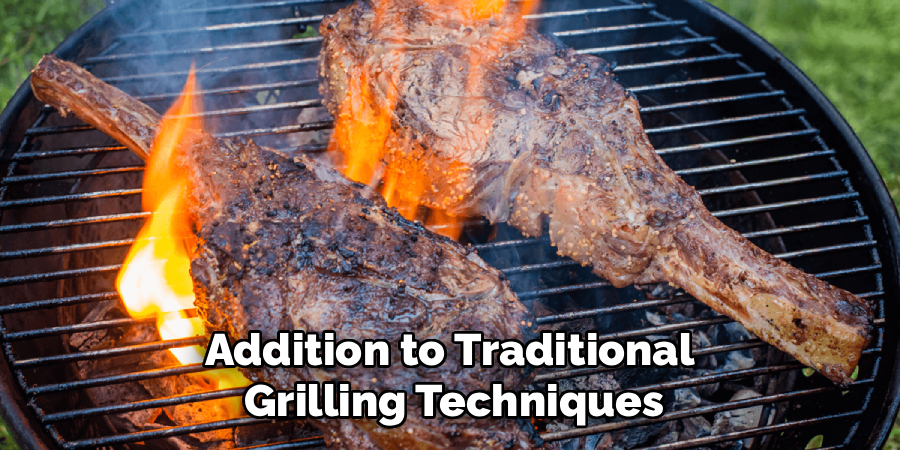
Frequently Asked Questions
What causes grease fires on grills?
Grease fires occur when fat or oil drips onto hot grill surfaces or open flames, igniting a blaze. This usually happens from grilling fattier cuts of meat like pork ribs or burgers. Over time, grease can also accumulate in trays or grates, increasing the risk of fire if not cleaned regularly.
How can I prevent grease from building up in my grill?
The best way to prevent grease build-up is by cleaning your grill grates and grease tray after each use. Trim excess fat off meats before cooking and pay close attention when grilling fatty items. Additionally, avoid setting burners to excessively high temperatures for extended periods, as this can worsen grease splattering.
How do I know when it’s safe to use my grill after a grease fire?
Ensure your grill is completely cool before inspecting it for damage or remaining grease. Clean the grill thoroughly to remove any residue. Perform an inspection of the components, such as burners and grates, to confirm they are in good condition. If no damage is found, your grill is safe to use again.
Can I use sand instead of baking soda to extinguish a grease fire?
While not ideal, sand is another option for smothering grease fires if baking soda isn’t available. However, sand can be harder to clean and may damage your grill’s surfaces. Baking soda remains the more practical choice because it doesn’t leave harmful residues.
Are grease fires the same as flare-ups?
No, grease fires and flare-ups are not the same. Flare-ups are brief, controlled bursts of flames caused by drippings hitting hot surfaces. These are usually harmless and fade quickly. A grease fire, however, is an uncontrolled flame fueled by oil or fat and requires intervention.
Conclusion
Handling a grease fire on your grill doesn’t have to be intimidating. By following the practical steps outlined here, you can confidently stop a grease fire on a grill without panic or injury. Remember to act quickly, avoid water, and have essential tools like baking soda or a fire extinguisher nearby.
With these tips in your toolkit, you’re ready to grill safely and enjoy delicious meals without unnecessary stress. Take precautions, stay vigilant, and enjoy the flavors of perfectly grilled food—risk-free!
Professional Focus
Angela Ervin, a former interior designer turned blogger, specializes in kitchen design and renovations. Through her website, she blends her passion for cooking with design expertise, sharing practical and creative ideas. Known for balancing functionality and beauty, Angela’s insightful content has made her a trusted voice in home design and lifestyle.
About the Author
Angela Ervin, an experienced interior designer and blogger, combines her passion for kitchen renovations with storytelling. Living in Petersburg with her family, she enjoys cooking and testing her projects firsthand. Known for her humor and relatable style, Angela shares creative, functional design insights through her content, making her a trusted voice in home design.
Education History
University: Virginia Commonwealth University
Degree: Bachelor of Fine Arts (BFA) in Interior Design
- Angela’s education at VCU focused on mastering core interior design principles, including spatial planning, color theory, materials selection, and sustainable design practices.
- She gained hands-on experience through studio projects and collaborative design exercises, which honed her ability to create functional and aesthetically pleasing environments.
- Her coursework also emphasized problem-solving and practical applications of design, preparing her for real-world projects like her self-directed kitchen renovations.
- The program’s strong foundation in both technical skills and creative expression shaped Angela’s ability to seamlessly integrate form and function in her work.
